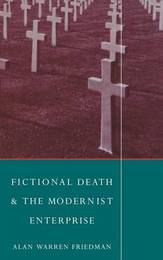
|
Fictional Death and the Modernist Enterprise
Hardback
Main Details
| Title |
Fictional Death and the Modernist Enterprise
|
| Authors and Contributors |
By (author) Alan Warren Friedman
|
| Physical Properties |
| Format:Hardback | | Pages:354 | | Dimensions(mm): Height 235,Width 157 |
|
| Category/Genre | Literary studies - from c 1900 -
Literary studies - fiction, novelists and prose writers |
|---|
| ISBN/Barcode |
9780521442619
|
| Classifications | Dewey:823.009354 |
|---|
| Audience | | Professional & Vocational | |
|---|
| Illustrations |
9 Halftones, unspecified; 9 Halftones, unspecified
|
|
Publishing Details |
| Publisher |
Cambridge University Press
|
| Imprint |
Cambridge University Press
|
| Publication Date |
26 January 1995 |
| Publication Country |
United Kingdom
|
Description
Cultures reveal themselves in how they react to death: how they ritualise it, tell its story, heal themselves. Before the modern period, death and dying seemed definitive, public, and appropriate. The industrial revolution, the Great War, and the radical re-envisioning of inner and outer reality after Marx, Darwin, Nietzsche, Einstein, van Gennep, and Freud, destabilised cultural norms and transformed the protocols of death and dying. In Fictional Death and the Modernist Enterprise Alan Friedman traces the semiotics of death and dying in twentieth-century fiction, history, and culture. He describes how modernist writers either, like Forster and Woolf, elided rituals of dying and death; or, rediscovering the body as Lawrence and Hemingway did, transformed Victorian 'aesthetic death' into modern 'dirty death'. And he goes on to show how, through postmodern fiction and AIDS narratives, death has once again become cultural currency.
Reviews"...an ambititous, intelligent work with a far broader scope than its title suggests. Drawing upon an array of canonical works throughout Western literature as well as a trove of extra-literary materials, Friedman provides a rich and informative context for evaluating the treatement of death, or the absence of treatment, in modernist literature." English Literature in Transition 1880-1920
|